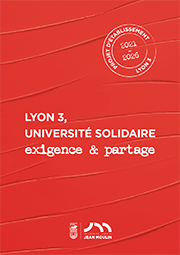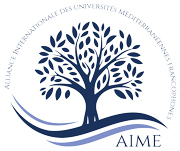AccueilRechercheProgrammes et productions scientifiquesThèsesThèses soutenuesThèses soutenues - 2006-2021Thèses soutenues - 2017
-
Partager cette page
- Recherche,
MEYNIER Adeline
Réflexions sur les concepts en droit de l’environnement
Publié le 13 février 2018 – Mis à jour le 13 décembre 2018
Thèse en Droit mention Droit mention Droit public, soutenue le 11 décembre 2017.
Le droit moderne de l’environnement apparaît, en France, dans les années 1960. Il émerge de manière empirique en réaction à de grandes catastrophes écologiques et intervient dans les domaines les plus divers pour mettre en place des garde-fous juridiques propres à limiter la dégradation de l’environnement. Le droit est alors fragmenté, technique et constitue la plupart du temps un simple placage des mécanismes et des concepts juridiques classiques sur un nouvel objet : l’environnement. Le manque de cohérence et de construction du droit est progressivement pallié par l’affirmation de principes, l’édiction d’un Code et la consécration de la Charte constitutionnelle de l’environnement. En outre, au gré des réformes, le droit se construit autour de nouveaux concepts. Les concepts écologiques, qualifiés auparavant d’insuffisants pour appréhender l’environnement sont complétés avec la prise en compte, par exemple, des concepts d’écosystème, de processus écologiques ou de solidarité écologique. Une dimension conceptuelle du droit de l’environnement émerge en droit positif avec les notions phares de patrimoine commun de l’humanité, de développement durable, de précaution, d’irréversibilité, susceptible d’en rassembler les morceaux épars et d’affirmer la maturité du droit de l’environnement. La conceptualisation récente du droit de l’environnement participe d’une construction plus aboutie et d’une simplification et généralisation de la matière.
Modern environmental law appeared in France in the 1960s. It emerged empirically in response to major ecological disasters and intervened in the most diverse fields to set up legal safeguards to limit the environmental degradation. The law was then fragmented, technical and usually constituted a mere plating of conventional legal mechanisms and concepts on a new object: the environment. The lack of coherence and the construction of the law was gradually mitigated by the assertion of principles, the enactment of a Code and the consecration of the Constitutional Charter of the Environment. In addition, as the reforms proceed, law is being built around new concepts. Ecological concepts, previously qualified as insufficient to understand the environment, are supplemented by taking into account, for instance, ecosystem concepts, ecological processes or ecological solidarity. A conceptual dimension of environmental law emerges in positive law with the flagship notions of the common heritage of humanity, sustainable development, precaution, irreversibility, capable of gathering scattered pieces and asserting the maturity of environmental law. The recent conceptualization of environmental law is part of a more complete construction and a simplification and generalization of the subject matter.
Modern environmental law appeared in France in the 1960s. It emerged empirically in response to major ecological disasters and intervened in the most diverse fields to set up legal safeguards to limit the environmental degradation. The law was then fragmented, technical and usually constituted a mere plating of conventional legal mechanisms and concepts on a new object: the environment. The lack of coherence and the construction of the law was gradually mitigated by the assertion of principles, the enactment of a Code and the consecration of the Constitutional Charter of the Environment. In addition, as the reforms proceed, law is being built around new concepts. Ecological concepts, previously qualified as insufficient to understand the environment, are supplemented by taking into account, for instance, ecosystem concepts, ecological processes or ecological solidarity. A conceptual dimension of environmental law emerges in positive law with the flagship notions of the common heritage of humanity, sustainable development, precaution, irreversibility, capable of gathering scattered pieces and asserting the maturity of environmental law. The recent conceptualization of environmental law is part of a more complete construction and a simplification and generalization of the subject matter.
Mots-clés :
Droit de l’Environnement – France ; Construction – Conceptualisation – Droit ; Maturité du Droit – Droit de l’environnement ; Concepts – Notions – Définitions ; Rôle des concepts en Droit
Keywords :
Environmental Law – France ; Concept development – Conceptualization – Law; Maturity of Law – Environmental Law ; Concepts – Notions – Definitions ; Role of concepts in Law.
Directeur(s).trice(s) de thèse : M. Philippe BILLET
Droit de l’Environnement – France ; Construction – Conceptualisation – Droit ; Maturité du Droit – Droit de l’environnement ; Concepts – Notions – Définitions ; Rôle des concepts en Droit
Keywords :
Environmental Law – France ; Concept development – Conceptualization – Law; Maturity of Law – Environmental Law ; Concepts – Notions – Definitions ; Role of concepts in Law.
Directeur(s).trice(s) de thèse : M. Philippe BILLET
Membres du jury :
M. Philippe BILLET, Professeur des universités, Université Jean Moulin Lyon 3,
Mme Sylvie CAUDAL, Professeure des universités émérite, Université Jean Moulin Lyon 3.
Mme Marie-Pierre CAMPROUX-DUFFRENE, Maître de conférences habilité à diriger des recherches, Université de Strasbourg,
M. Gilles MARTIN, Rapporteur, Professeur des universités émérite, Université Côte d’Azur, Nice
M. Jean UNTERMAIER, Co-directeur de thèse, Professeur honoraire, Université Jean Moulin Lyon 3,
Mme Agathe VAN LANG, Rapporteur, Professeure des universités, Université de Nantes.
Président.e du jury : Mme Sylvie CAUDAL
Equipe d'accueil : UMR 5600 - EVS (IDE)
Mme Sylvie CAUDAL, Professeure des universités émérite, Université Jean Moulin Lyon 3.
Mme Marie-Pierre CAMPROUX-DUFFRENE, Maître de conférences habilité à diriger des recherches, Université de Strasbourg,
M. Gilles MARTIN, Rapporteur, Professeur des universités émérite, Université Côte d’Azur, Nice
M. Jean UNTERMAIER, Co-directeur de thèse, Professeur honoraire, Université Jean Moulin Lyon 3,
Mme Agathe VAN LANG, Rapporteur, Professeure des universités, Université de Nantes.
Président.e du jury : Mme Sylvie CAUDAL
Equipe d'accueil : UMR 5600 - EVS (IDE)
Décision : Admise
Documentation
Mise à jour : 13 décembre 2018







